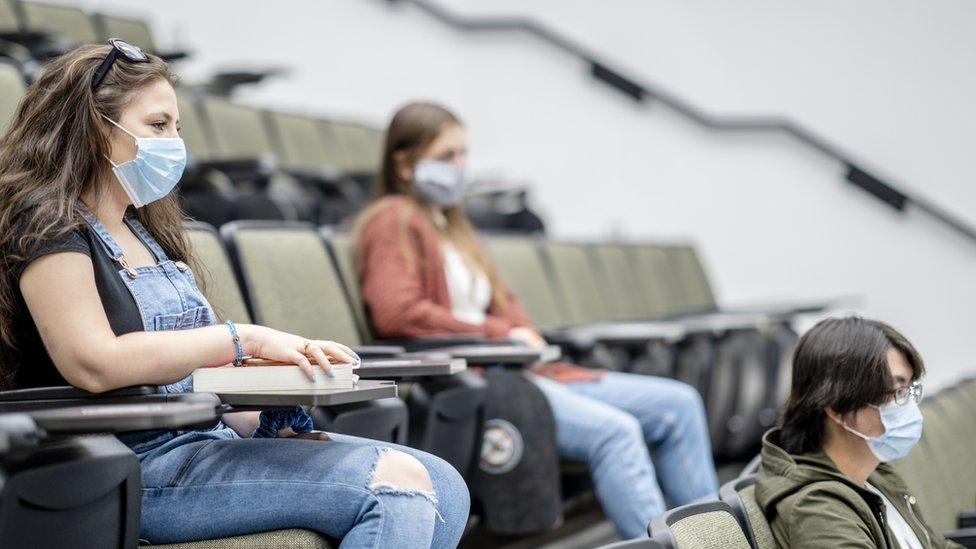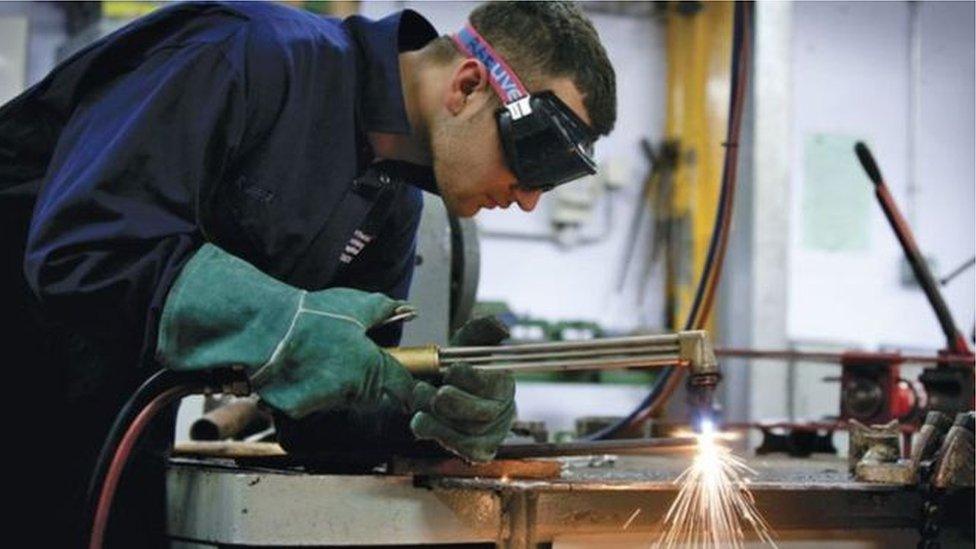Further education: 'Generous' exam grades part of NI numbers fall
- Published

Student numbers at Northern Ireland's further education colleges dropped by 20% in the first full academic year of the pandemic
"More generous" GCSE and A-level grades during the pandemic are one of the reasons for a fall in student numbers at further education (FE) colleges.
That is according to an analysis by the Department for the Economy (DfE).
It said better grades meant students were more likely to go to sixth form or university than further education.
Student numbers in Northern Ireland's six further education colleges dropped by 20% in the first full academic year of the pandemic.
Almost 71,000 students were in further education in 2019-20 compared to under 56,000 in 2020-21.
Student numbers across the six colleges have also fallen by almost a third in just five years - down from over 80,000 in 2016-17.
The department said the decrease was caused by there being fewer 16-19 year olds, fewer people taking part-time courses and the effect of the pandemic on running community-based classes.
Those trends have also led to a significant drop in the number of qualifications awarded by further education colleges.
They awarded 52,000 qualifications in 2020-21, down from 83,000 in 2016-17 - a fall of more than a third (37%).
There were 13,600 fewer qualifications awarded between 2019-20 and 2020-21 alone - down 20%.

The department's analysis indicates numbers have been dropping for the past five years
Northern Ireland's further education colleges offer a huge range of courses and qualifications - from part-time "hobby" or "leisure" courses to vocational subjects and apprenticeships and higher education degrees.
But the department's analysis of trends in further education points to a big drop in the number of students over the past five years, with a particularly steep fall from 2019-20 to 2020-21.
The department said that "decreasing part-time enrolments and the number of 16-19 year-olds dipping to its lowest level since the 1950s" were some of the reasons for the decline in numbers.
But it also said numbers had been "exacerbated by Covid-19 related factors, such as more generous GCSE and GCE grades (leading to school pupils being more likely to progress to sixth form or university)".
As formal GCSE, AS and A-level exams have not taken place for two years due to the coronavirus pandemic, schools have calculated the grades awarded to pupils.
That has led to a rise in the number of pupils receiving top grades at A-level and GCSE.
All of Northern Ireland's six further education colleges have seen significant decreases in student numbers over the past five years - but those falls were highest between 2019-20 and 2020-21.
For instance, South-West College saw student numbers fall by more than a third according to the department - from 13,573 in 2019-20 to 8,473 in 2020-21.
The drop in the number of students taking "non-regulated courses" - which include those for recreation or hobbies - was particularly steep, falling from 13,600 to just over 5,000 in the first year of the pandemic.
But the number of students taking "regulated" courses - which lead to a qualification - also fell by 11% during that year and has decreased by a quarter over the past five years.

The DfE analysis also shows FE subjects like construction and engineering are still dominated by men
The Department for the Economy spends about £210m a year on further education, about a quarter of its annual budget.
But department officials have recently expressed concerns that the executive's draft budget and a loss of EU funding could lead to a number of cuts in education and skills.
A UK-wide experts body has previously recommended that all adults in Northern Ireland should have the chance to take a further education qualification for free.
The department's analysis also shows that further education subjects like construction and engineering are still dominated by men.
About 7,300 of 7,529 (97%) enrolments on courses related to construction, planning and the built environment were male students.
By contrast, more than 80% of enrolments on courses related to health, public services and care were female students.
Related topics
- Published10 August 2021

- Published30 September 2021

- Published13 January 2022

- Published25 March 2021
